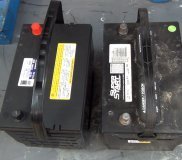What you consider "ridiculous" is in fact called the "relearn" procedure. No two sensors are ever exactly alike and to prevent having to do all kinds of time-consuming adjustments after replacing one, the computer learns the parameters by comparing all their readings to each other under varying driving conditions. Until the conditions are met for that relearn to take place the computer is starting from pre-programmed values from the factory.
There are so many different scenarios that no one can remember them all. I CAN share a real easy and common one for Chrysler products. Any time the battery is disconnected for other service the Engine Computer has to relearn "minimum throttle" before it will know when it must be in control of idle speed. Before it learns that it won't know when you're holding the gas pedal down a little or have it released. To meet the conditions for that relearn to take place you must drive at highway speed with the engine warmed up, then coast for at least seven seconds without touching the brake or gas pedals. Most experienced mechanics will do that on a test drive for the customer or they will at least explain the procedure to them. Most do-it-yourselfers aren't aware of that; in fact, some call it "ridiculous". Mitsubishi products use a similar procedure.
Engine Computers also store long-term fuel trim (LTFT) and short-term fuel trim (STFT) numbers in memory. After disconnecting the battery those numbers are lost from memory and the "lookup tables" are rebuilt while driving and modify the pre-programmed factory fuel metering values. You won't even know that is taking place.
You have further proof a relearn is needed on your car. There was no running problem before you disconnected the battery. All that changed was the battery. You should feel extremely lucky you don't own a Volkswagen pile. Along with General Motors and BMW, they have some of the best "got'chas" built into their cars to bleed money from unsuspecting owners. Most Volkswagens won't start after disconnecting the battery or letting it run dead. If it does start it won't come off of idle no matter what you do with the gas pedal, and it won't come out of park. That means dragging it skidding off the hoist onto a flatbed truck for a very expensive trip to the dealer to have the computers unlocked. It's one of many reasons I drive an '88 minivan and will never again buy a new car.
Friday, September 21st, 2012 AT 7:26 AM




